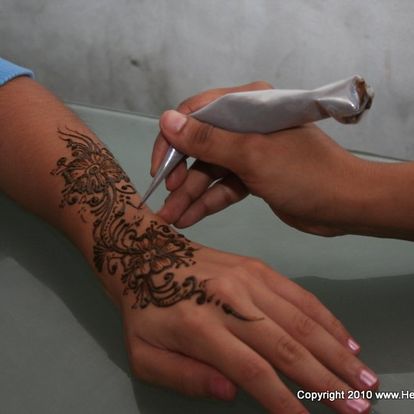What is Henna?
Henna is derived from a plant named Lawsonia inermis. Twice a year the leaves are harvested, dried, and ground into a fine powder. Henna powder is traditionally used to used to dye hair and skin. Professional artists usually will have their own original recipe to make the paste. I use pure henna powder, Eucalyptus oil, Clove oil, lemon juice, and tea.
Important Advisory on "Black Henna" and Our Safe, Natural Alternative: Jagua
"Black henna" is not true henna but a harmful mixture containing Para-phenylenediamine (PPD), a chemical dye that poses serious health risks. It's illegal for skin use due to its potential to cause allergic reactions, skin blistering, and long-term scarring. These products, often found at vacation spots, can seriously injure people due to PPD being a transdermal toxin and potential carcinogen.
In our commitment to health and authenticity, The Original Henna Company proudly offers Jagua as a 100% natural, non-toxic alternative. Sourced from the forests of Panama, Jagua provides a darker stain, ranging from bluish-gray to black, without the risks associated with "black henna."
Note:
Choose safety and beauty with Jagua, the natural way to achieve a darker, stunning body art expression.
"Black henna" is not true henna but a harmful mixture containing Para-phenylenediamine (PPD), a chemical dye that poses serious health risks. It's illegal for skin use due to its potential to cause allergic reactions, skin blistering, and long-term scarring. These products, often found at vacation spots, can seriously injure people due to PPD being a transdermal toxin and potential carcinogen.
In our commitment to health and authenticity, The Original Henna Company proudly offers Jagua as a 100% natural, non-toxic alternative. Sourced from the forests of Panama, Jagua provides a darker stain, ranging from bluish-gray to black, without the risks associated with "black henna."
Note:
Choose safety and beauty with Jagua, the natural way to achieve a darker, stunning body art expression.
How long will the application take?
Time will depend on the intricacy and the size of the design.
How long will the henna stain last?
Henna normally will last for about 2 weeks. However, it also depends on how well it is taken care of. I suggest keeping the design away from water for at least 24 hours after application. Using Eucalyptus oil darkens the stain and so does any brand chest rub!
Each person's skin stains differently. Each body part stains differently. Henna stains better on thick, dry and more alkaline skin. The palms and the feet stain the darkest and last the longest. As the skin gets thinner and more oily on the upper arm, upper back, stomach, chest, neck and thigh the stain will be weaker.
Also, more the henna stain rubs on the clothes the faster it will fade. Rubbing or friction against clothes will cause an exfoliation effect resulting in fading of the henna stain sooner.
Each person's skin stains differently. Each body part stains differently. Henna stains better on thick, dry and more alkaline skin. The palms and the feet stain the darkest and last the longest. As the skin gets thinner and more oily on the upper arm, upper back, stomach, chest, neck and thigh the stain will be weaker.
Also, more the henna stain rubs on the clothes the faster it will fade. Rubbing or friction against clothes will cause an exfoliation effect resulting in fading of the henna stain sooner.
Don't see the answer you're looking for?
How do I care for my henna?
Things to Know BEFORE you get your Henna:
- To ensure that the Henna lasts for a longer time period please exfoliate your skin with a mild scrub 24 hours before your appointment.
- It is recommended that you take a bath or shower before your appointment as you will have to keep the hennaed area away from water for about 24 hours.
- Sweat and moisture will make the henna stain lighter therefore it is best to avoid strenuous activity for at least 24-48 hours after henna application.
- Make sure that the skin is dry and free of any oils or lotions before henna application.
- You will have to leave the henna on until it dries (about 1hr) and let it fall off on its own or you can rub the dried henna off after 2 hours. So please wear something that will not touch the henna.
- Henna will stain clothing so it is recommended that you wear something dark just in the event you smear the design accidentally.
- If you are getting henna done on areas that you do not want exposed then please bring a shawl or a cover that can be used after the henna has dried for 30 minutes.
- DO NOT touch the henna design for at least one hour until after it dries.
- After the henna dries it will fall off on its own or you can rub it off after 2 hours.
- DO NOT wash the hennaed area for at least 24 hours after application.
- Henna stain will turn from orange to dark brown or deep burgundy, depending on where on the body it is applied, within 24-48 hours.
- Rubbing Vicks Vaporub/Eucalyptus oil/Tea Tree oil, after the henna has dried and fallen off, will enhance the stain and will make the henna stain last longer.
- Henna will last for about 1-3 weeks depending on where it is applied.
